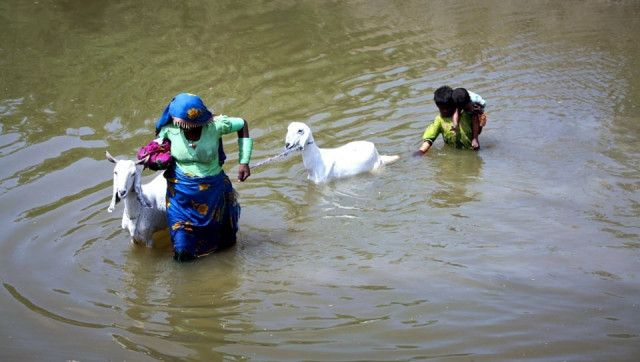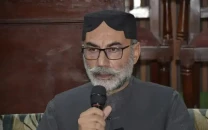Water, water everywhere, not a drop to drink
Sindh’s livestock at risk of being poisoned from toxic water and starvation due to scarce fodder.

With just a day remaining of the three-day long journey, the livestock breeder trudges, along with some three dozen animals, on the Mithi-Badin road connecting Tharparker with Badin.
He migrated to the green desert mountains of Thar from his village in Badin a month ago in order to save his livestock from the floods.
Soomro, however, is not returning because floodwaters have receded in Badin. “My animals were dying after consuming harmful water,” he says mournfully while speaking to The Express Tribune. He claims to have lost over a dozen animals during his stay in Thar.
Livestock breeders, such as Soomro, are caught between the devil and the deep blue sea.
“In Thar there are plenty of pastures for grazing but the water is noxious. In my village there is plenty of water but no fodder or dry land,” says Ramchand Kohli, another breeder, while traversing back with his animals from Thar to Umerkot.
Hundreds of small and big caravans of farm animals grimly decorate roads like Mirpurkhas-Umerkot, Umerkot-Mithi and Mithi-Badin.
Every year after the monsoon season, Thar turns green, and hosts livestock from the adjoining Badin, Umerkot and Mirpurkhas districts.
However, this year, rain entailed floods spiralled up the movement as breeders from districts as remote as Sanghar and Benazirabad flocked to the emerald desert.
Tariq Mehar, a breeder from Sanghar, acknowledges the danger posed by toxic water to the animals. “Some of them do not live longer than three to four weeks.” Although illiterate, he knows the source of contamination in the water: “This water can be used for up to three months by local people, but farm animals bathe and urinate in the same water. After a few days it turns toxic.”
No heed paid to feed
Backtracking from the sleepy village of Gorhiar, near the Nangarparker tehsil of Thar, Mehram Chang of Badin also articulates the same concern, although he prefers starvation than poisoning of his livestock.
“While the government provides ration to the people of Badin, why is it not arranging fodder for our animals which is equally as important; it is a source of our livelihood,” he says.
According to the Sindh government, this year’s floods have affected over 3.5 million livestock and killed over 150,000. The UN estimates that around 5 million have been affected and more than 80,000 have perished.
However, both are yet to respond to the food crisis.
“In the second week of September, we wrote to the Provincial Disaster Management Authority requesting to procure food stock from Punjab or Malaysia,” Ghulam Sarwar Shaikh, the director general of the Sindh Livestock Department, told The Express Tribune.
He regretted that his request has not yet been taken up.
‘Not enough’
The livestock department has allocated Rs6 million for supplying free feed stock in Dadu, Badin, Tando Muhammad Khan, Tando Allahyar, Mirpurkhas, Sanghar and Benazirabad districts.
“It’s a very small amount, as billions are required but we can only spend this much,” says Shaikh.
On the other hand, the United Nation’s Food and Agriculture Organization (FAO) has said that it is awaiting aid from the international donors to initiate the provision of free fodder.
“We launched an appeal of $18.9 million of which over 25 per cent will be earmarked for animal feed,” says Dr Fazal Bari of the FAO. “We want to provide fodder to at least 300,000 farming families for six to seven months.”
However, so far they have not received any aid.
“We are facing an acute shortage of feed stock in the flooded areas. Even the pastures are not sufficient as they lack fibre content,” Bari said while referring to the fresh grassy land of Thar.
Published in The Express Tribune, October 1st, 2011.



















COMMENTS
Comments are moderated and generally will be posted if they are on-topic and not abusive.
For more information, please see our Comments FAQ